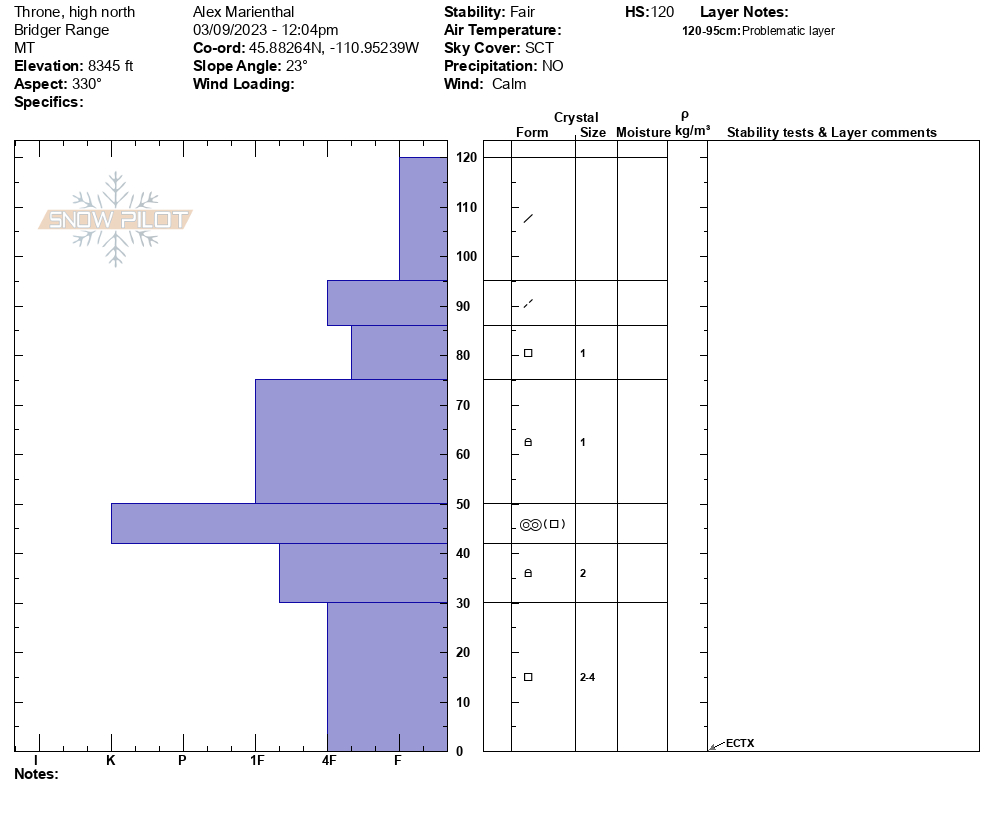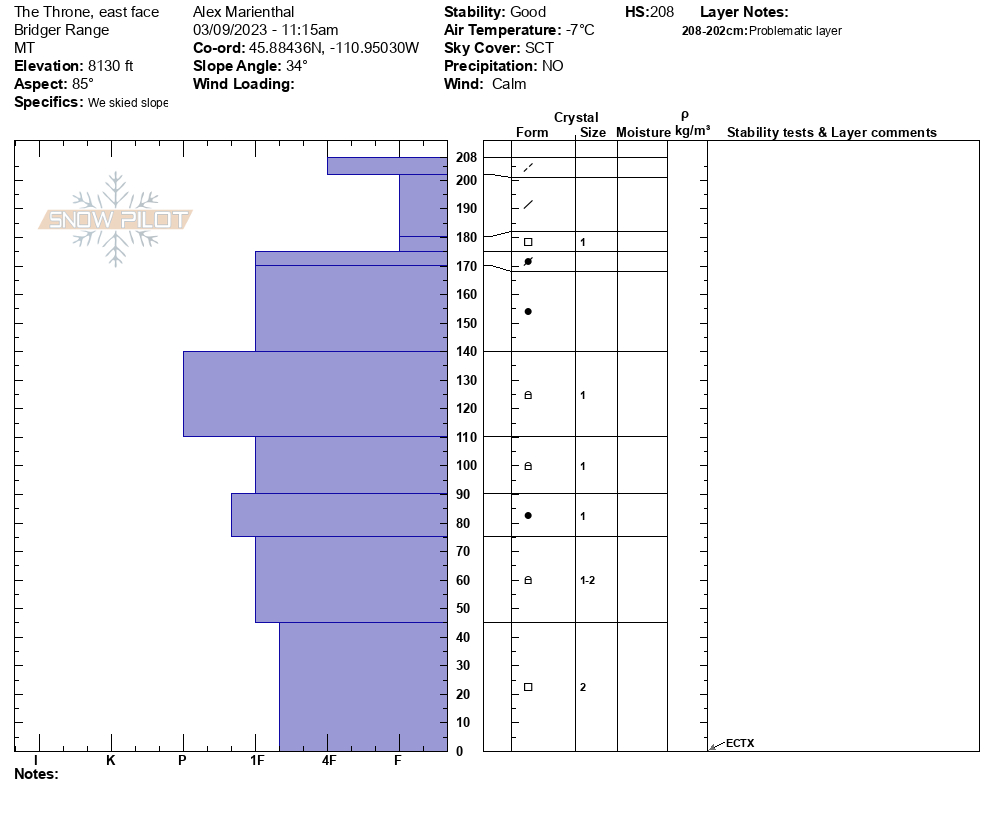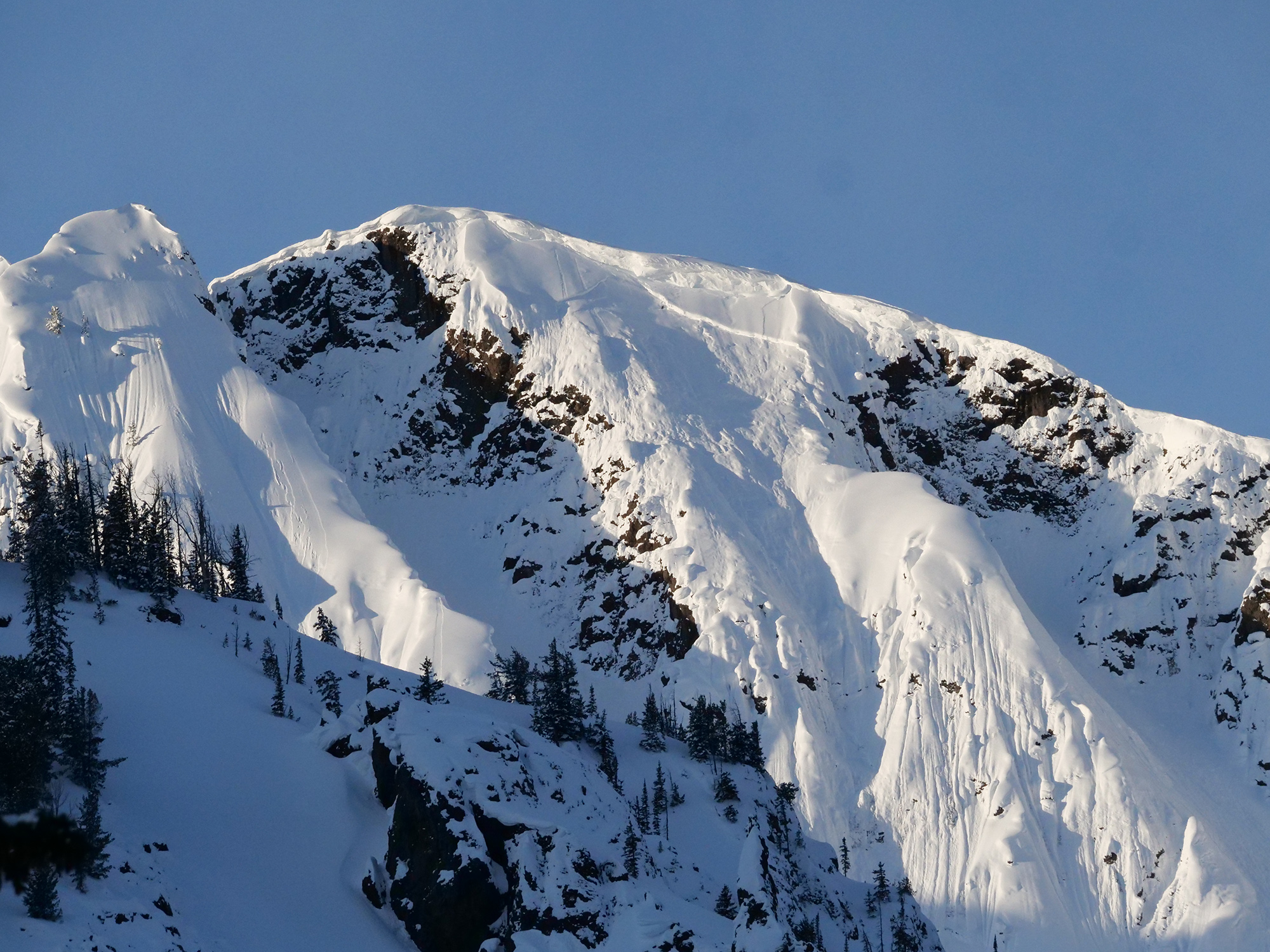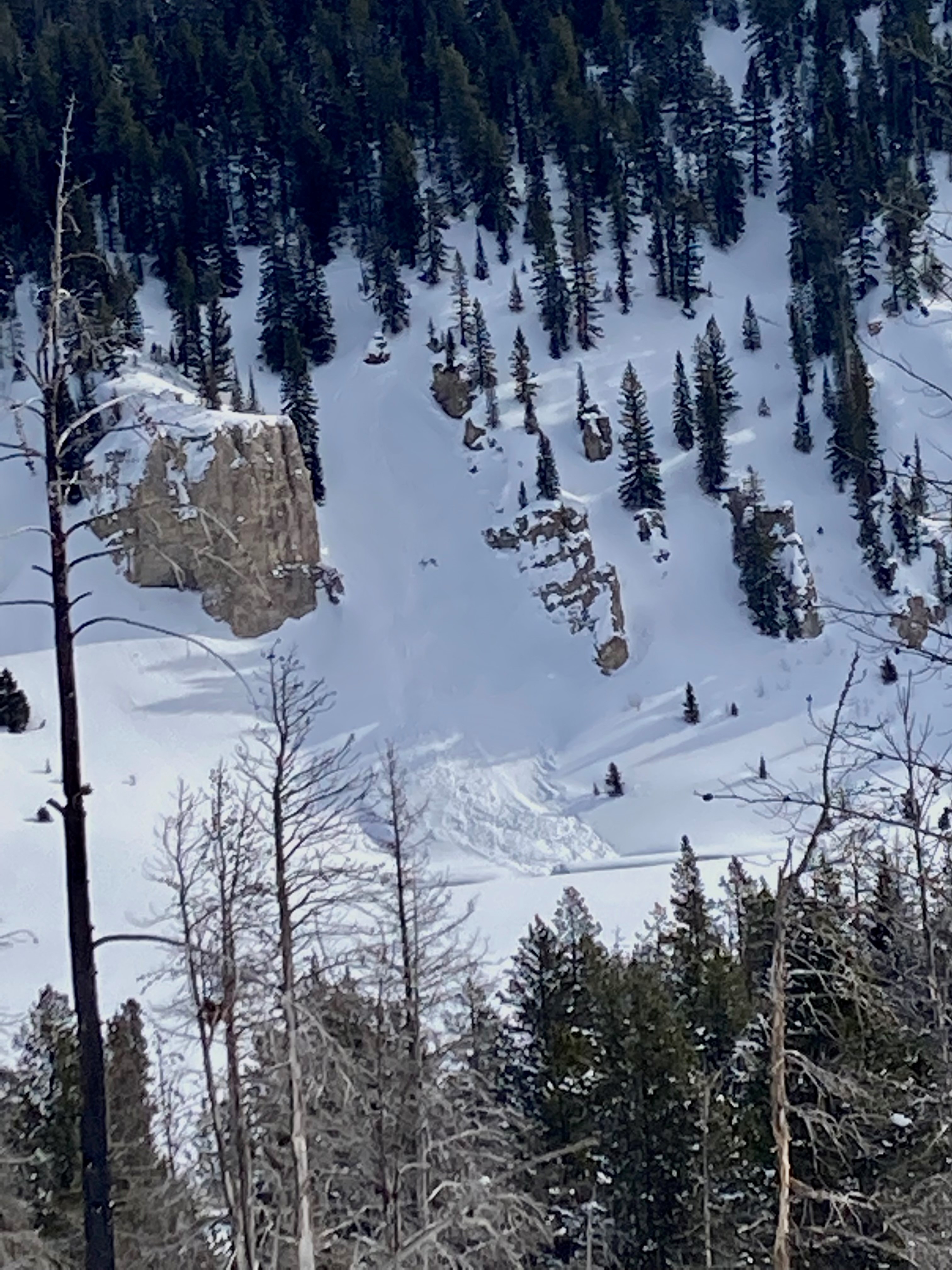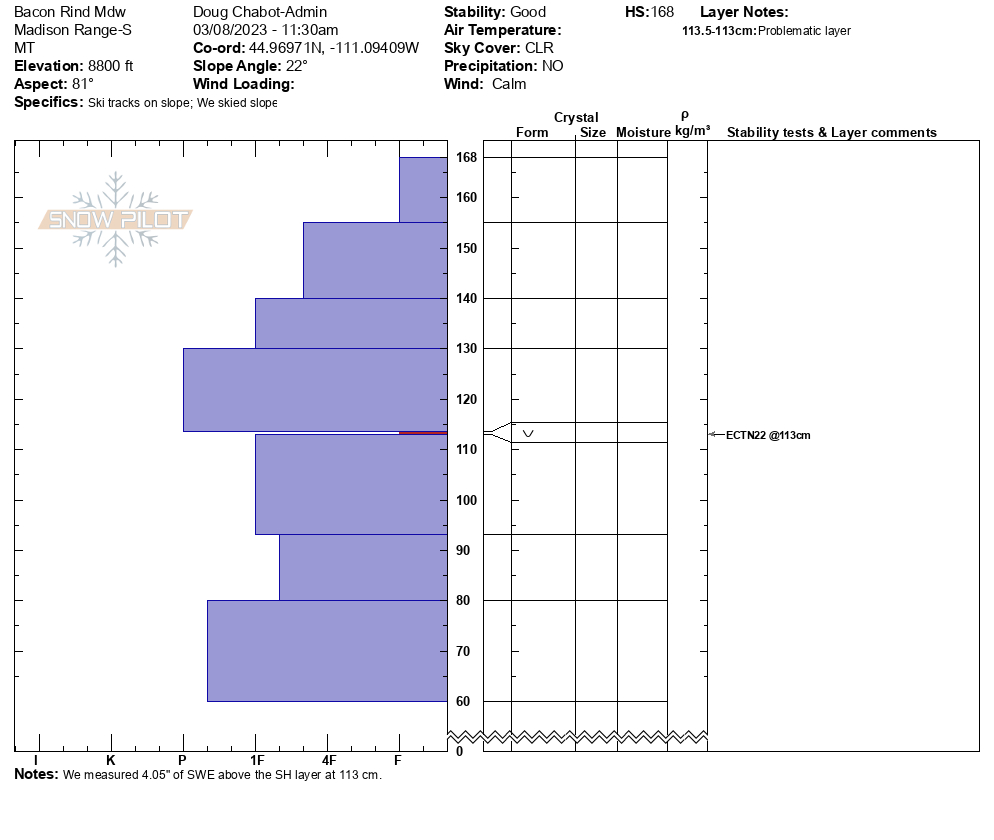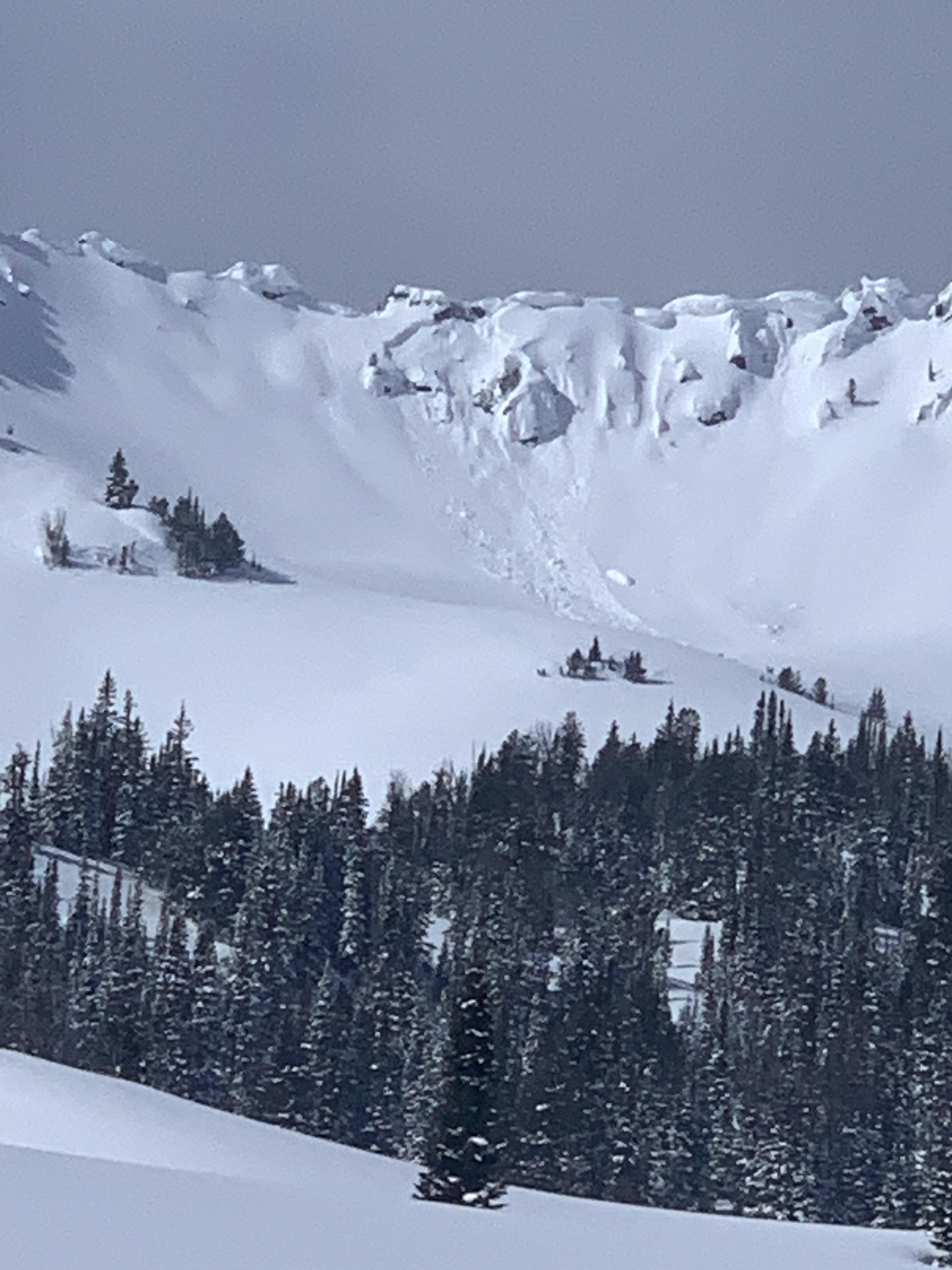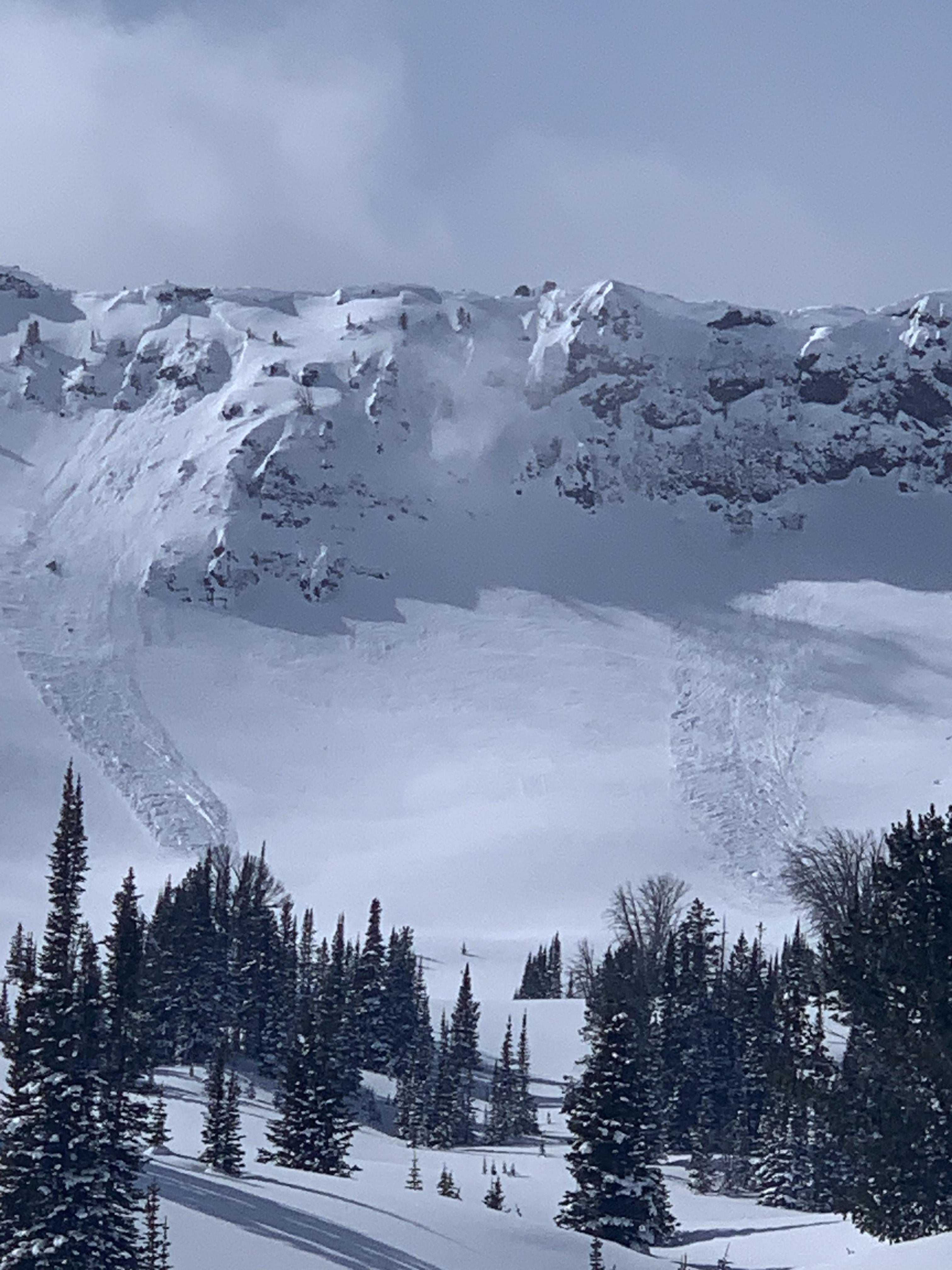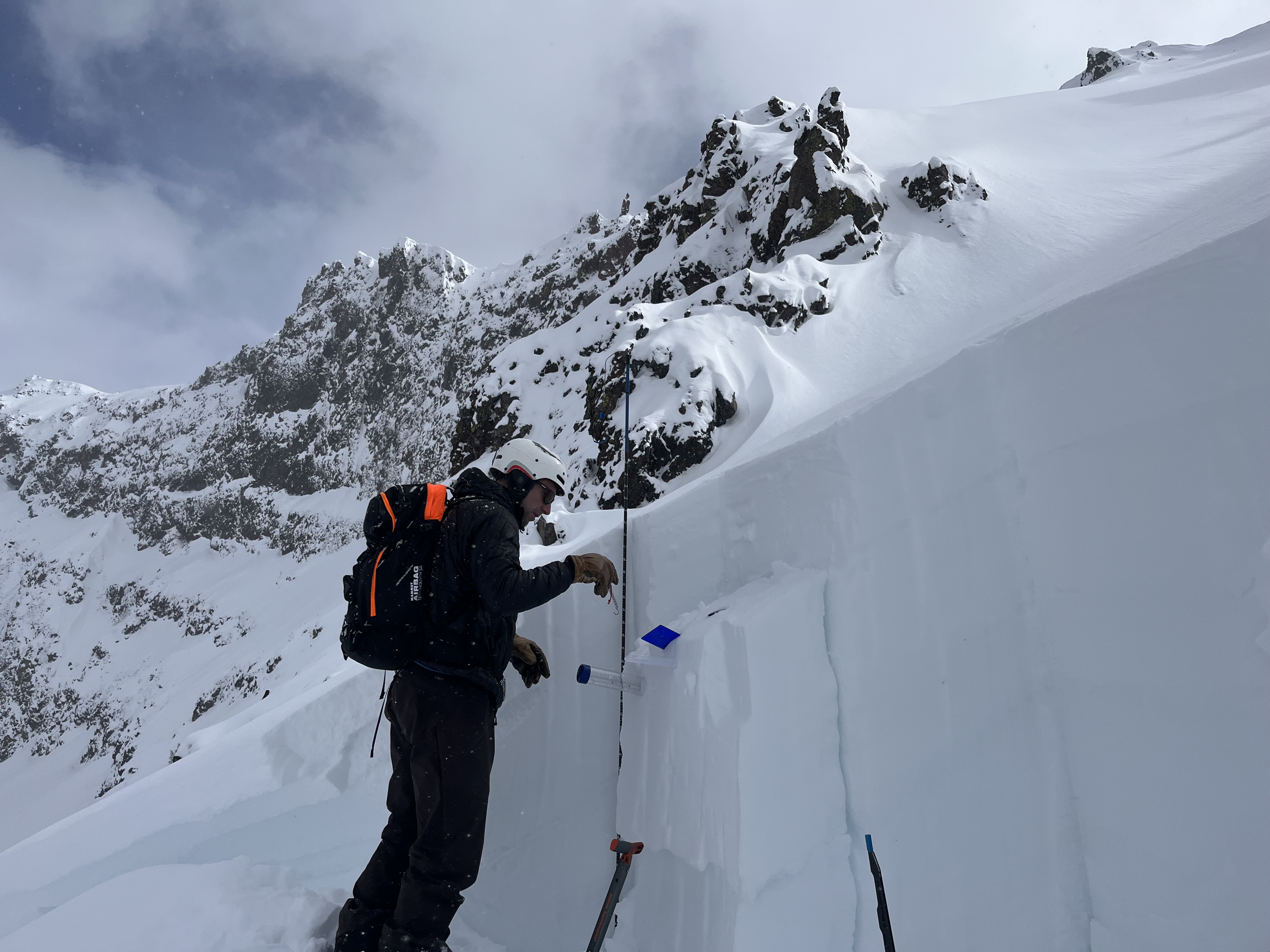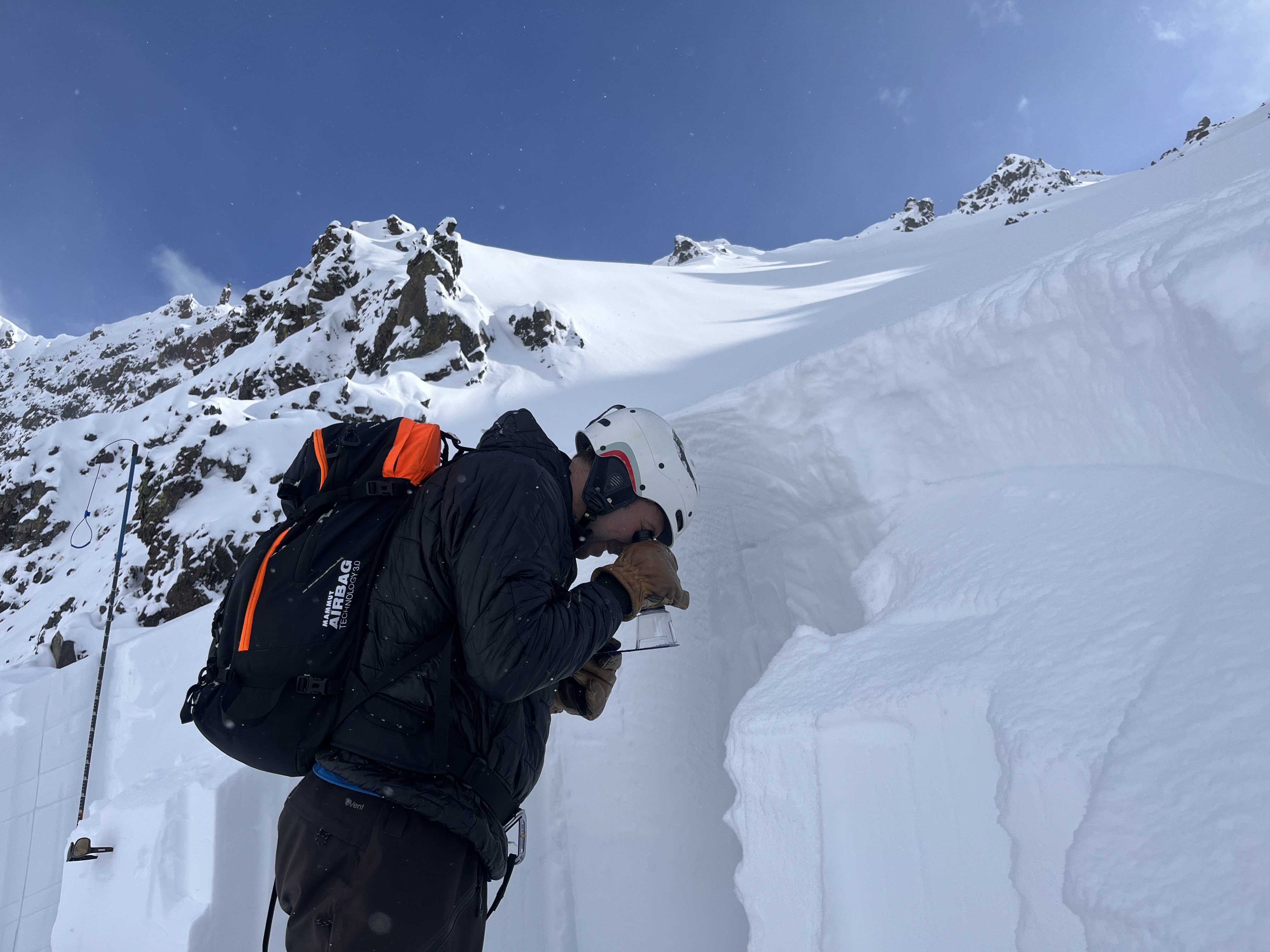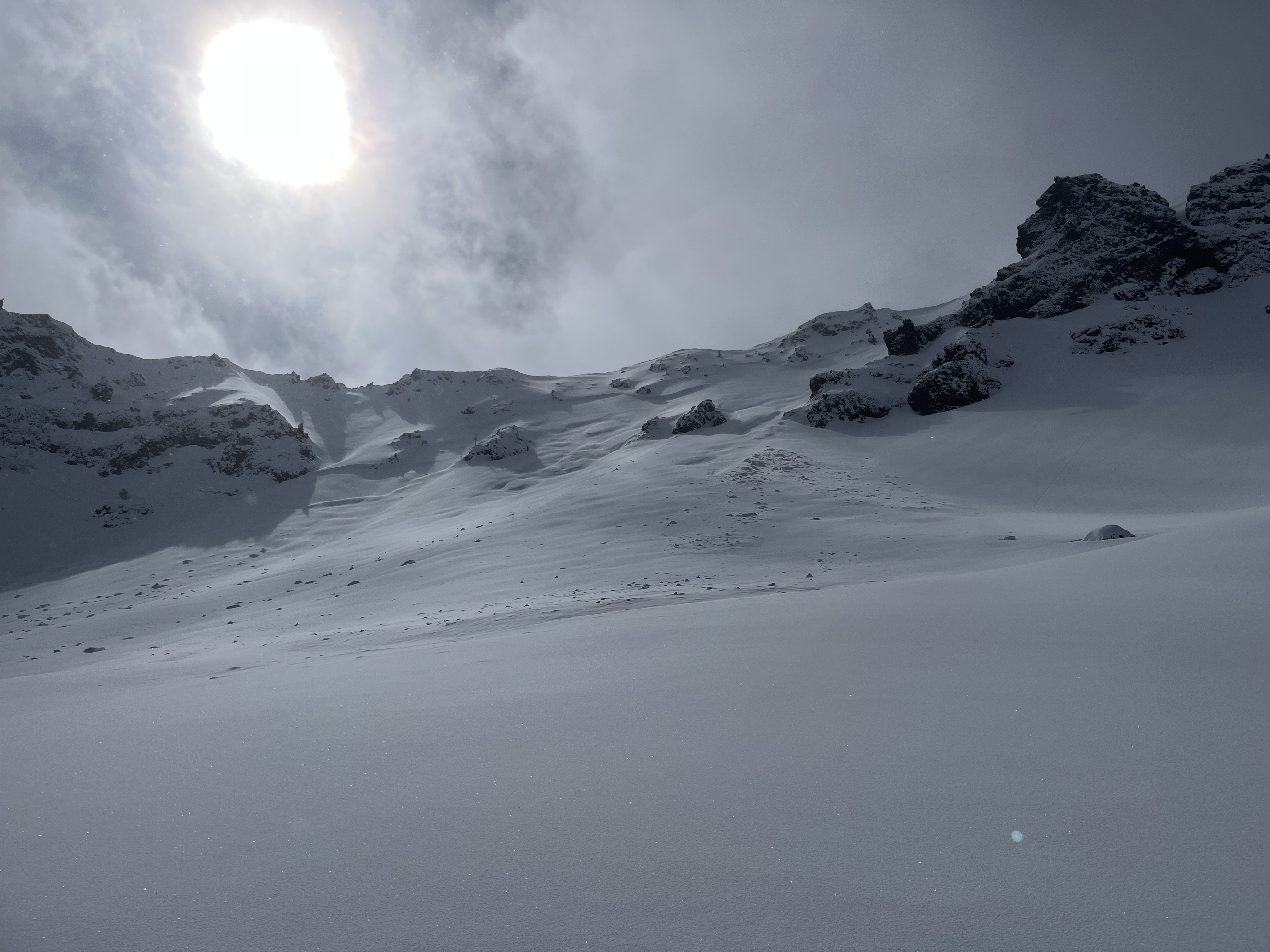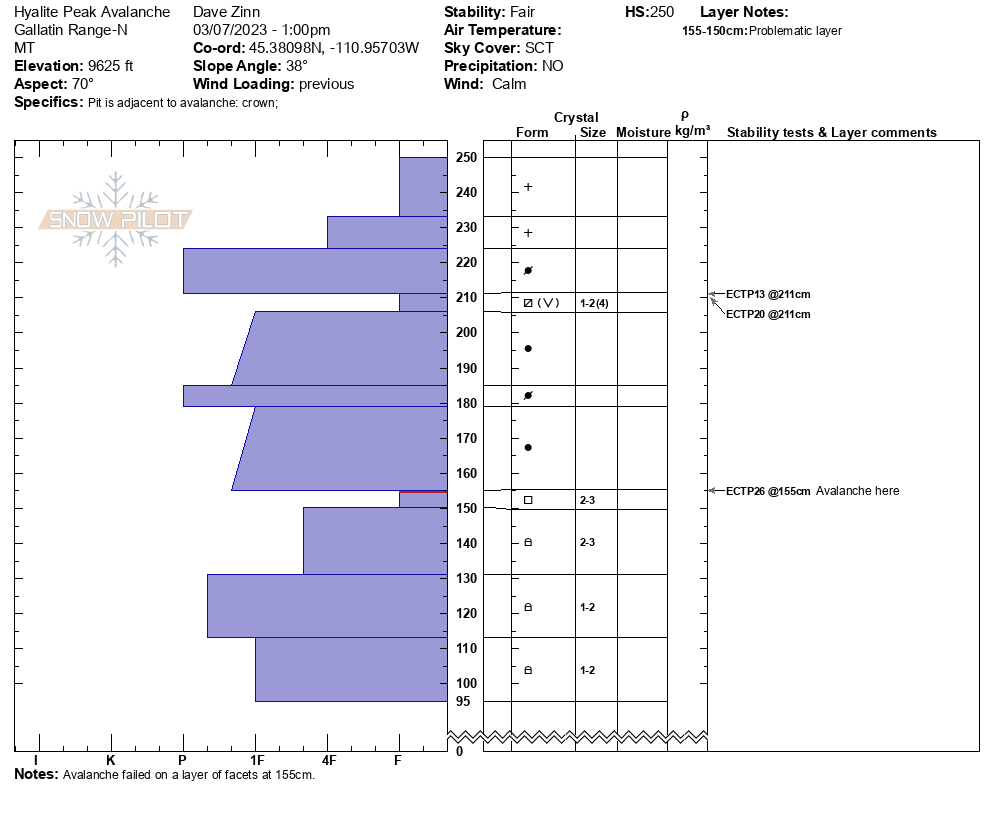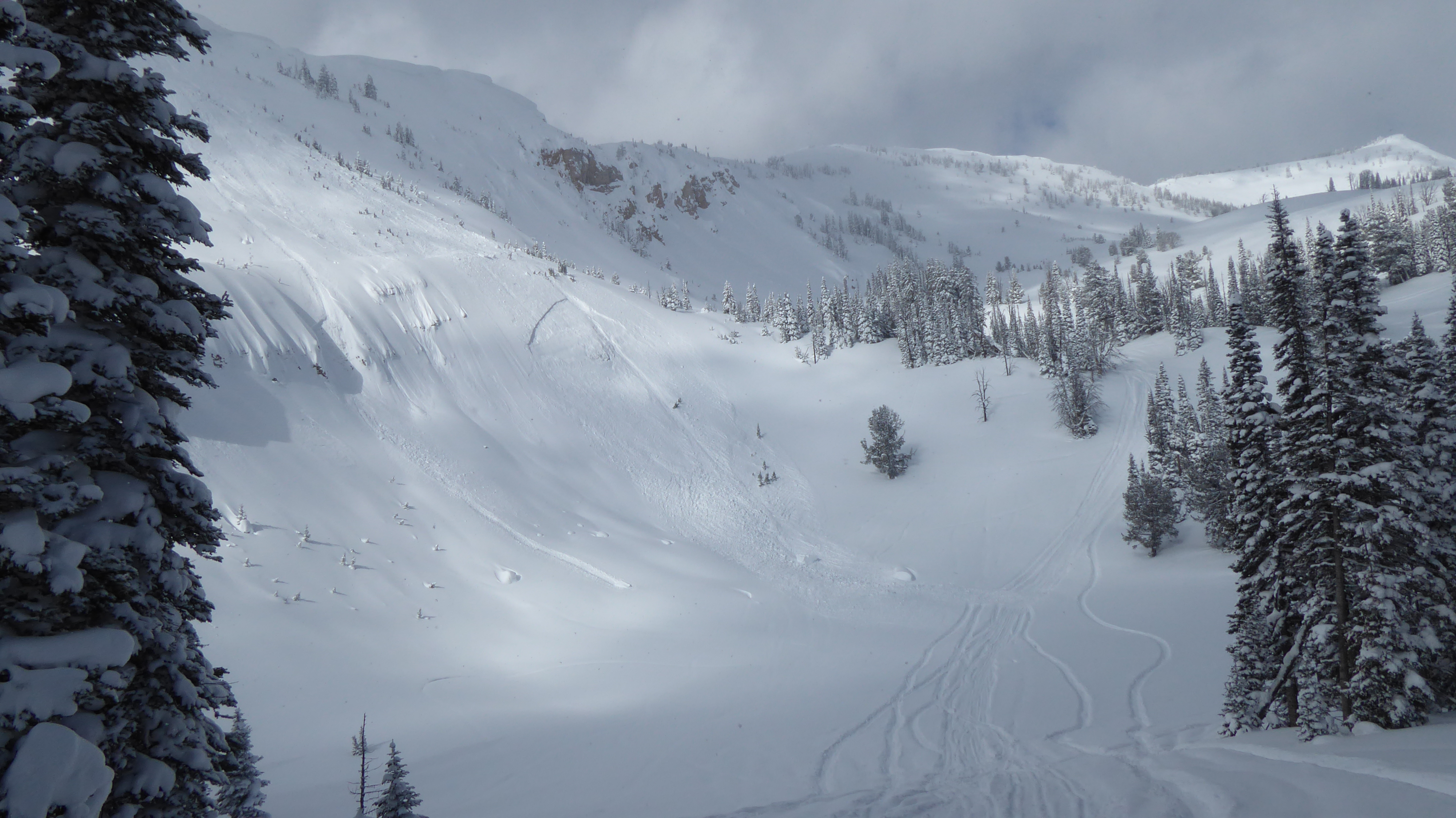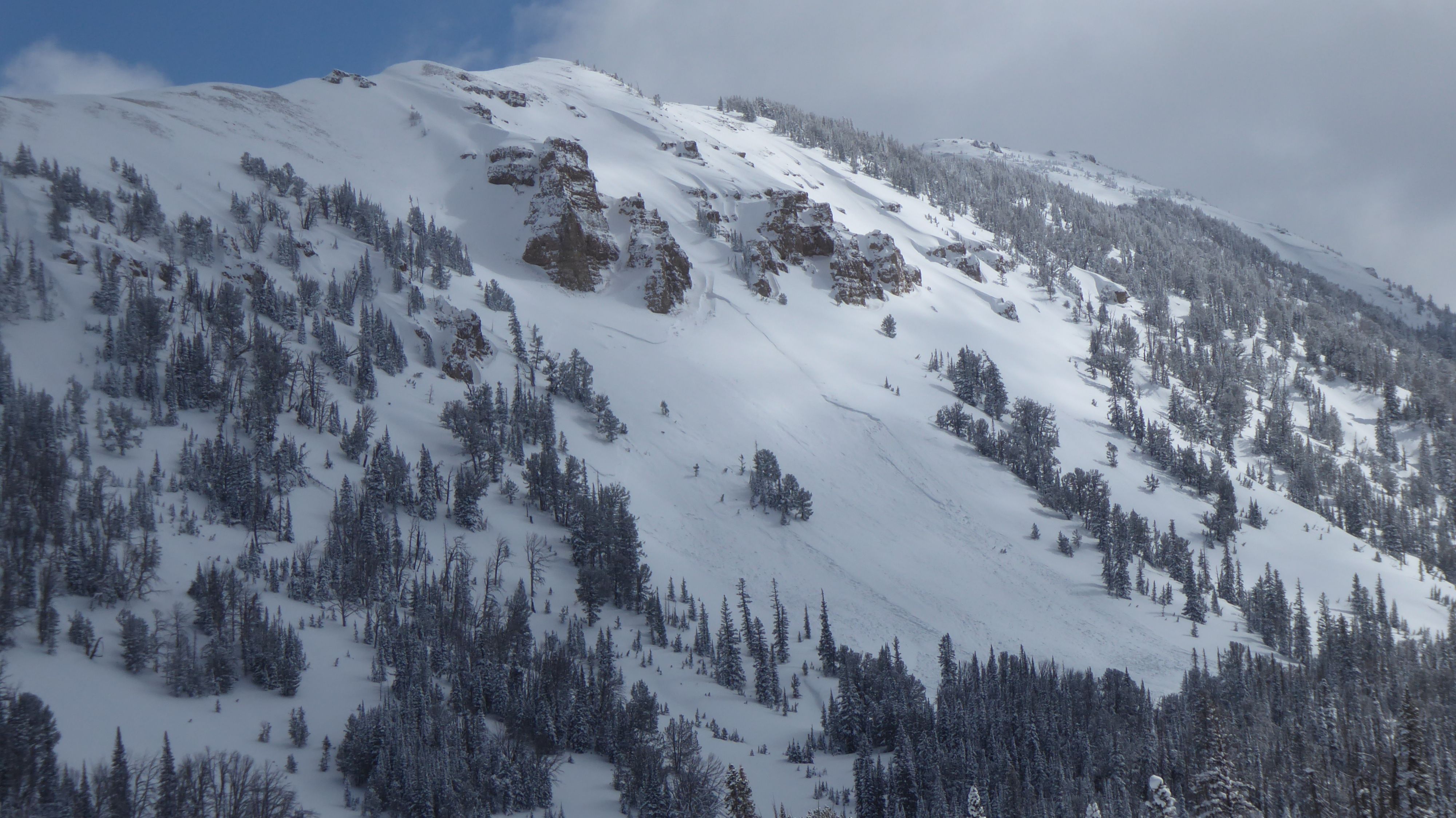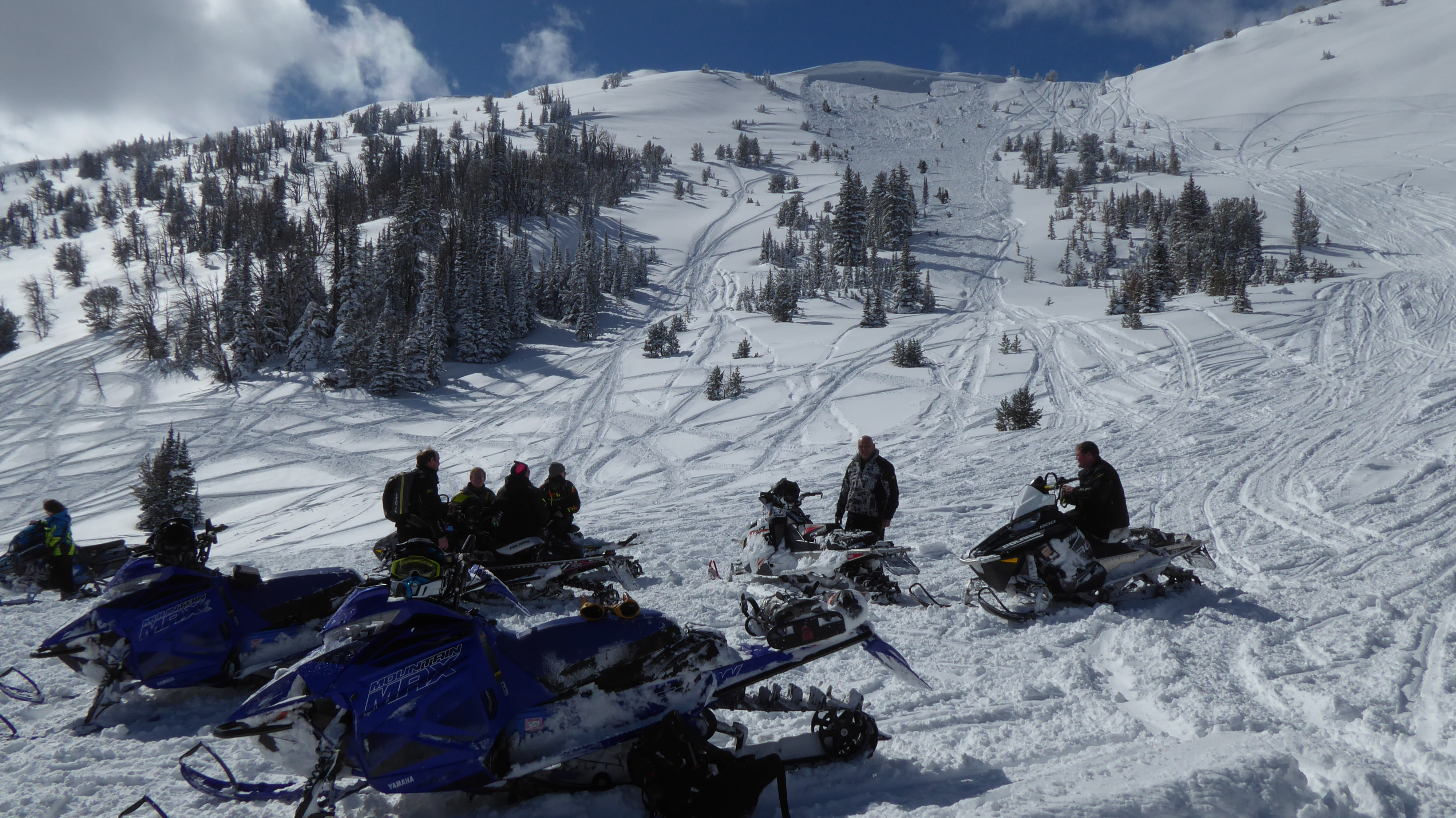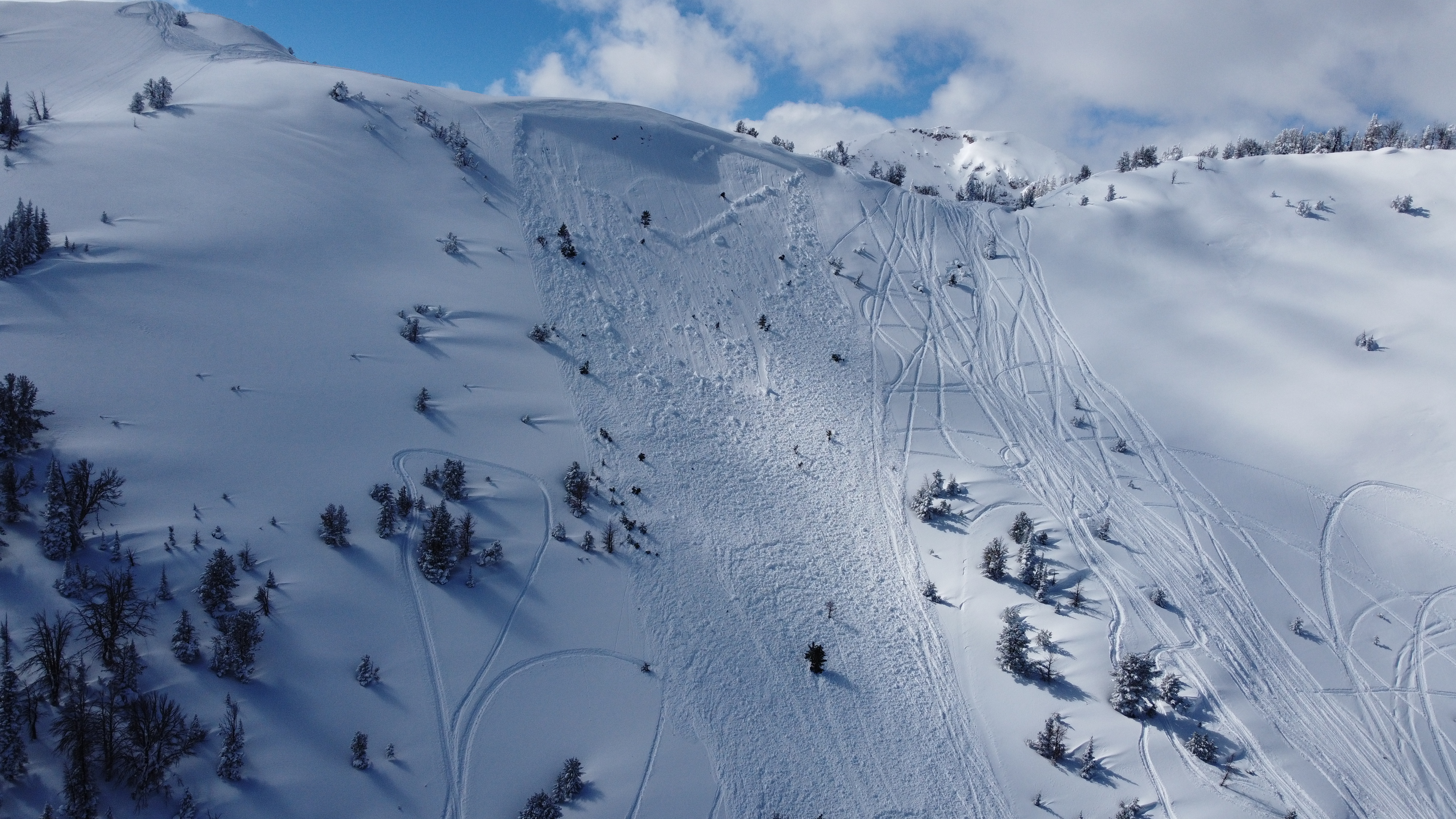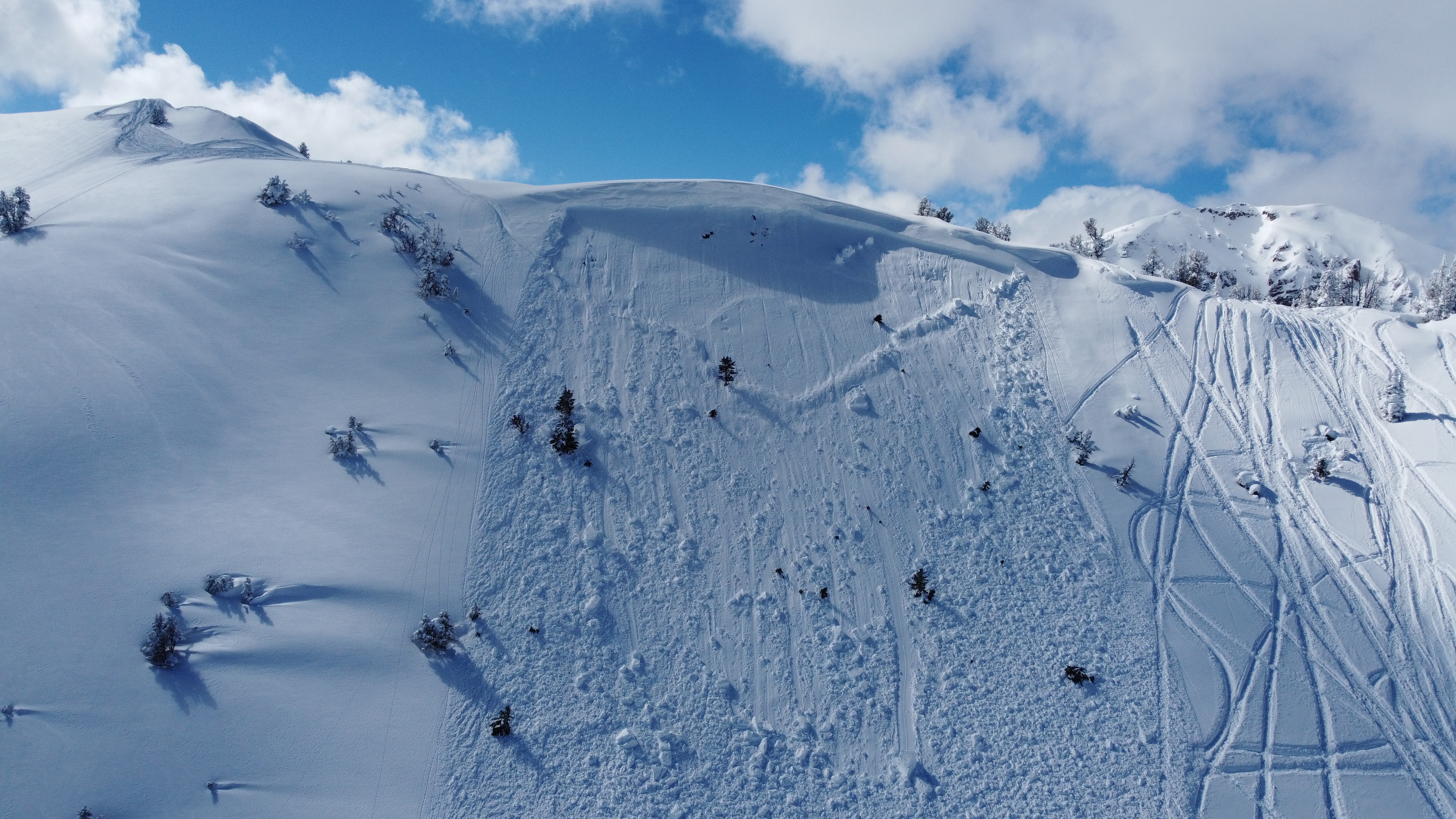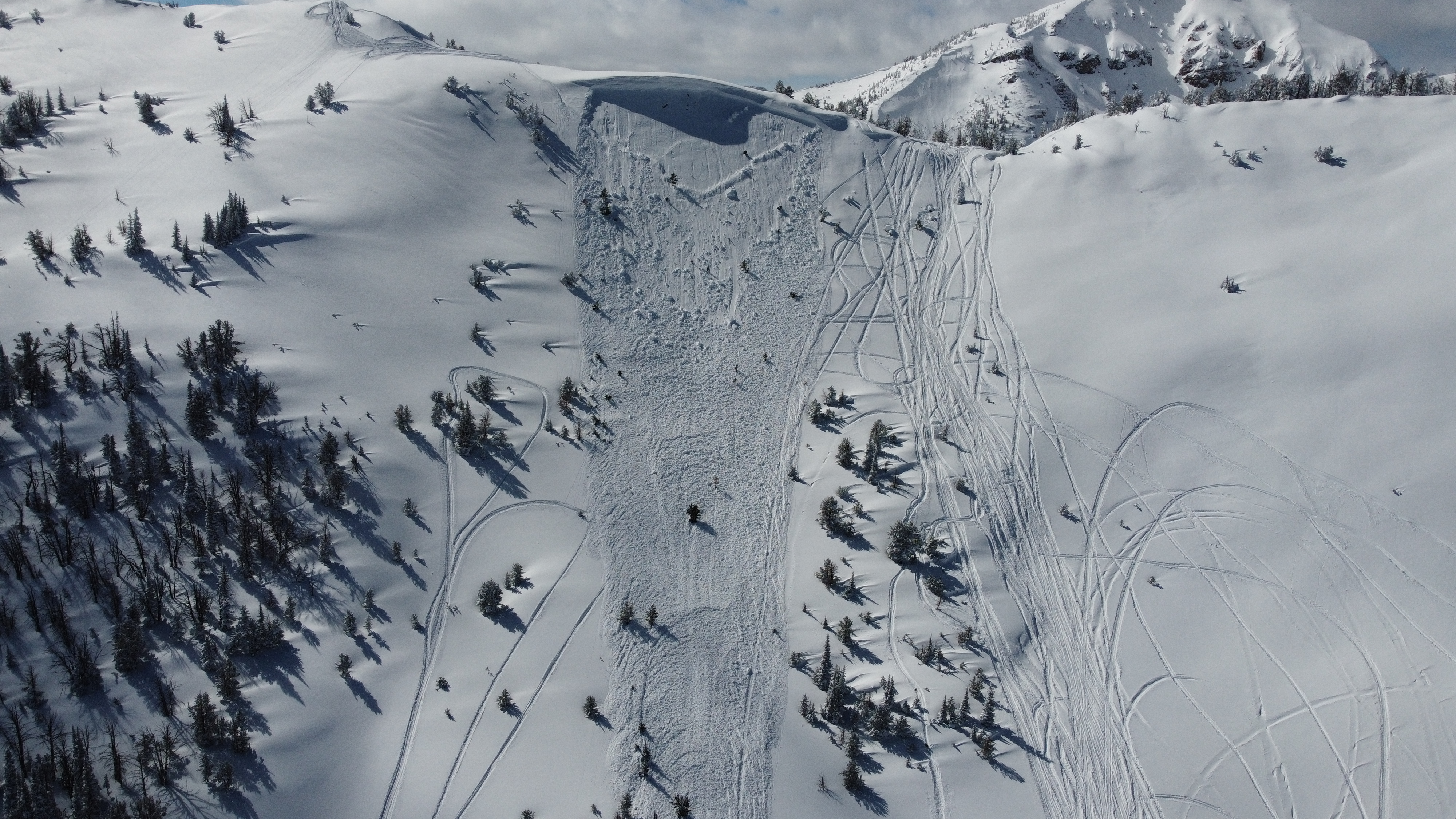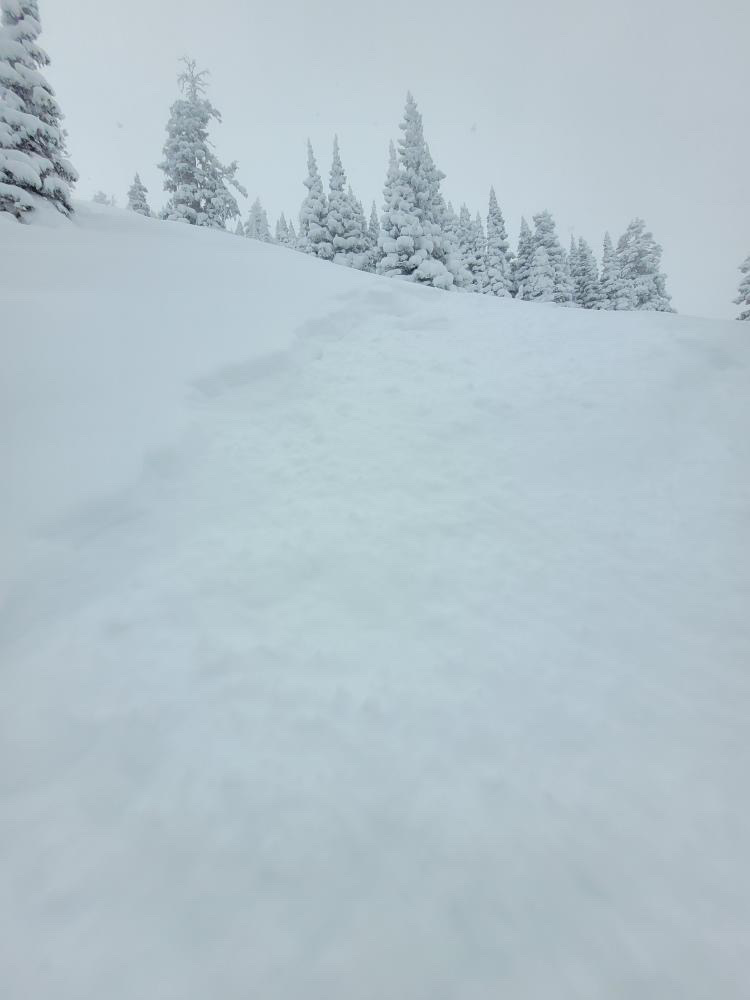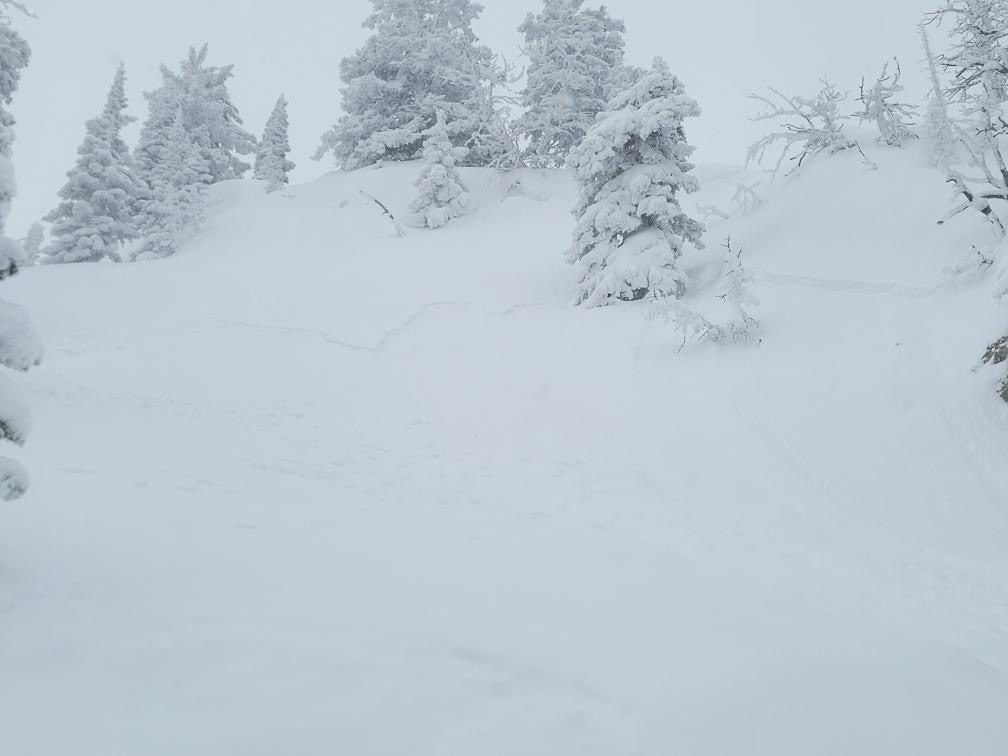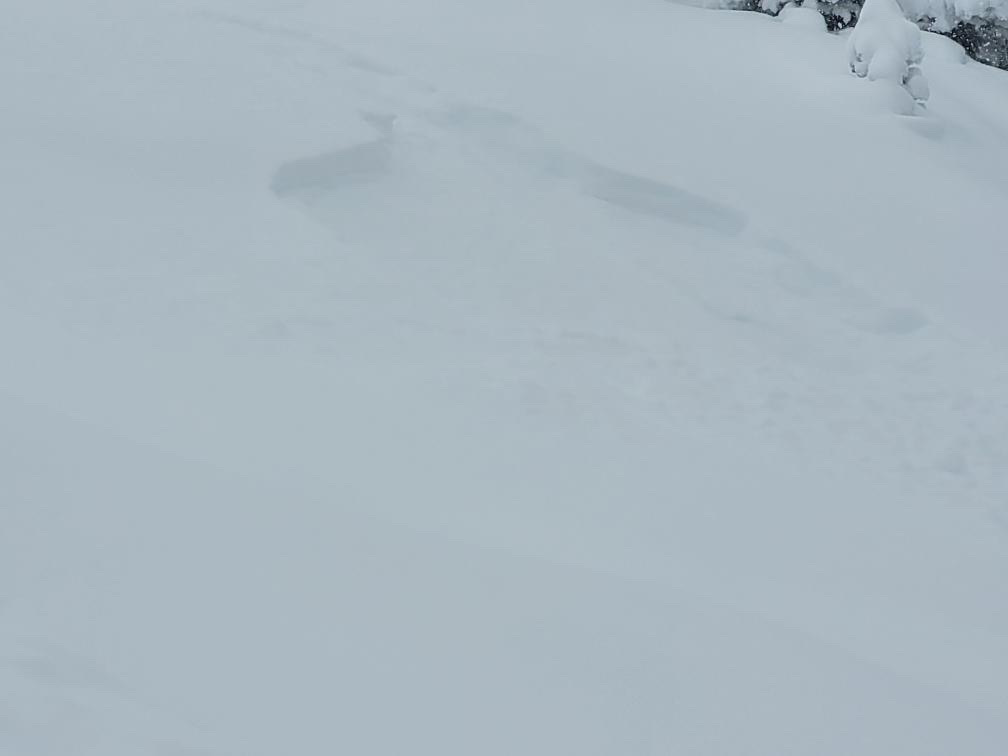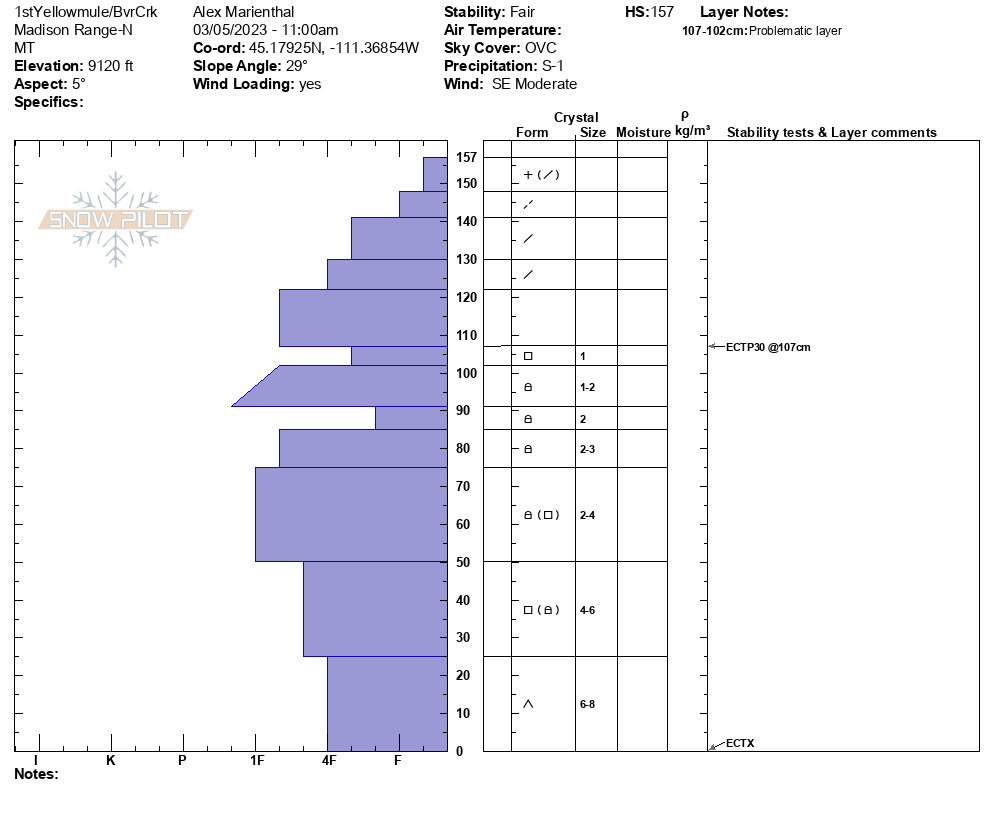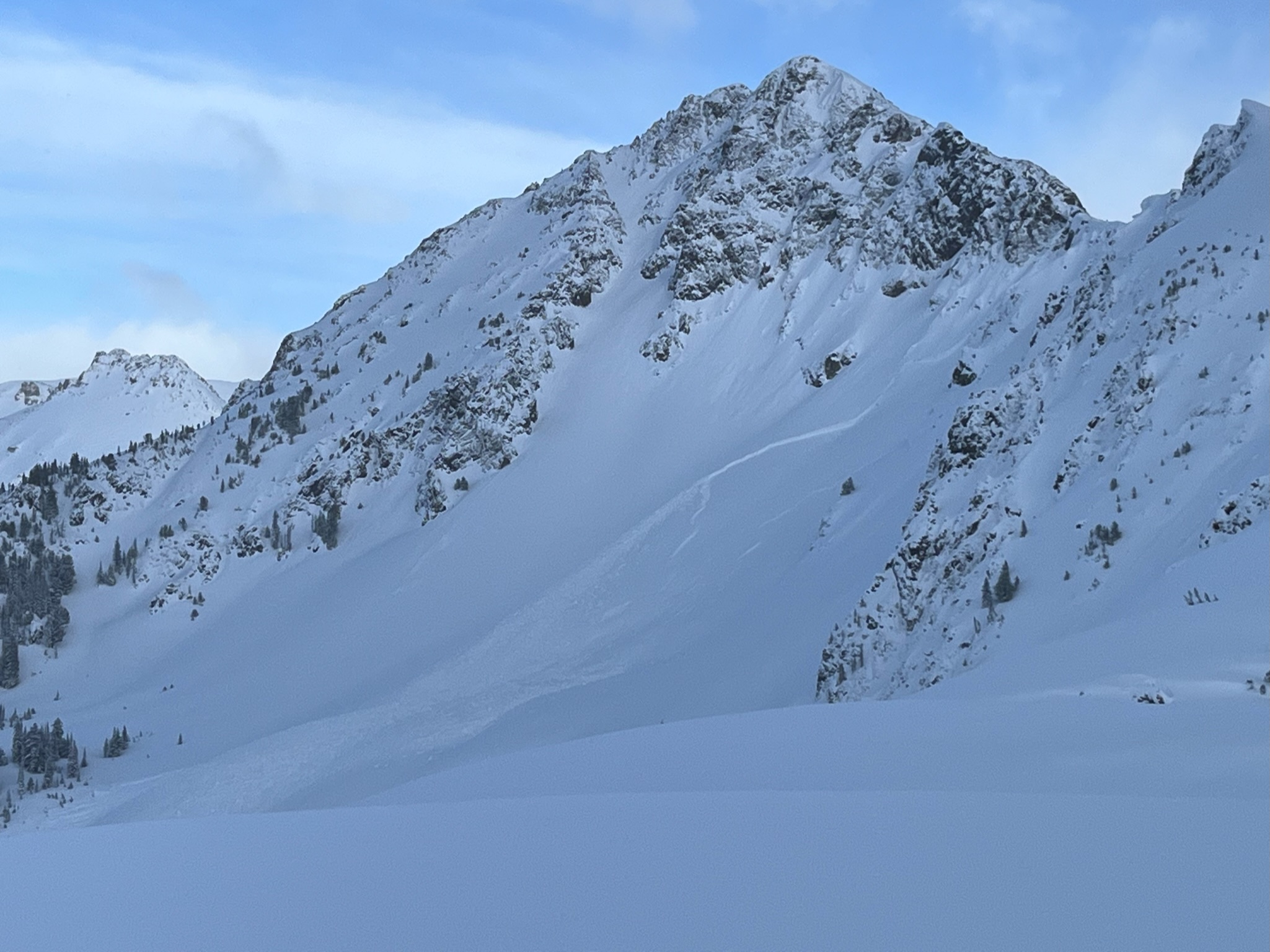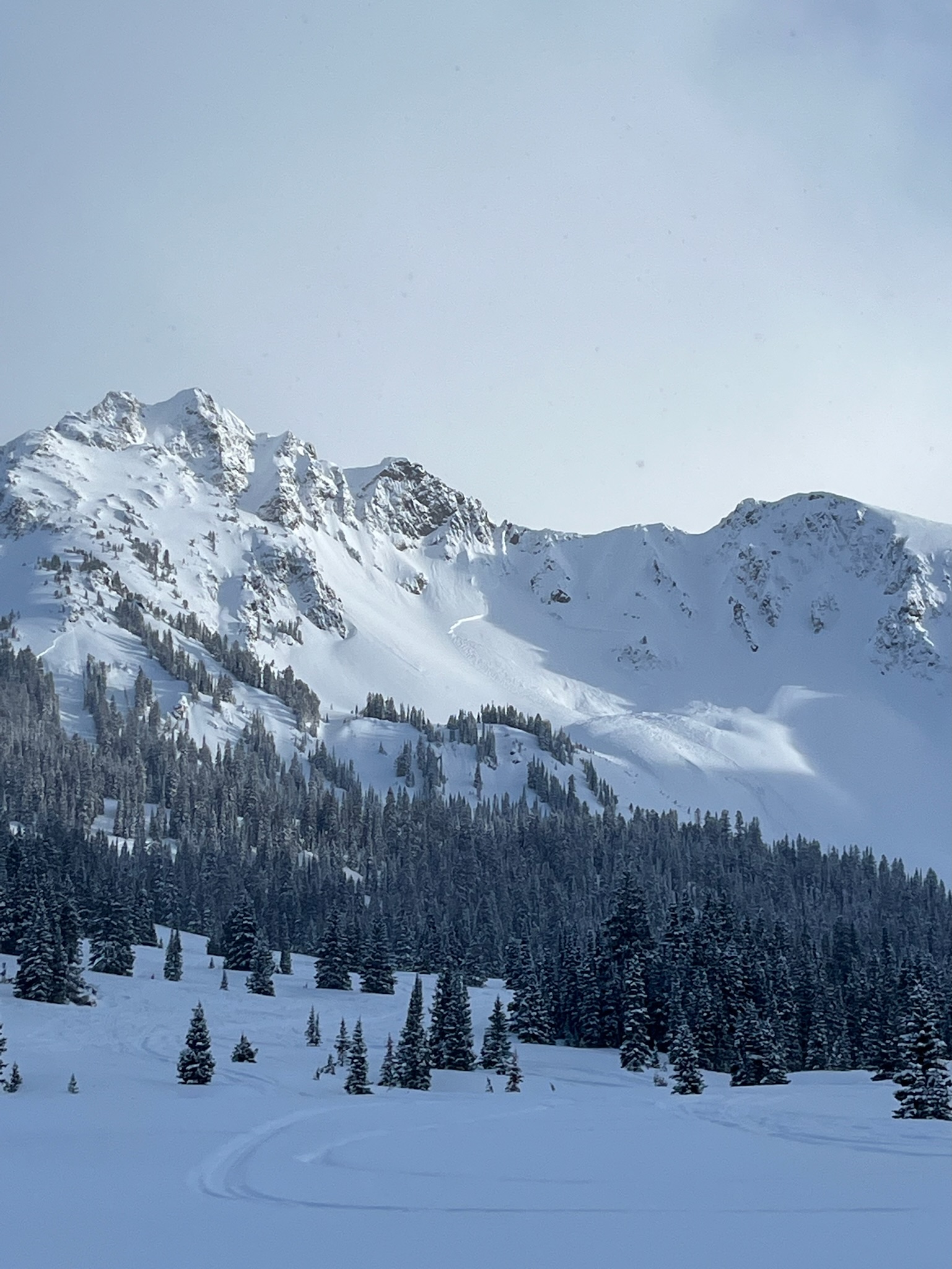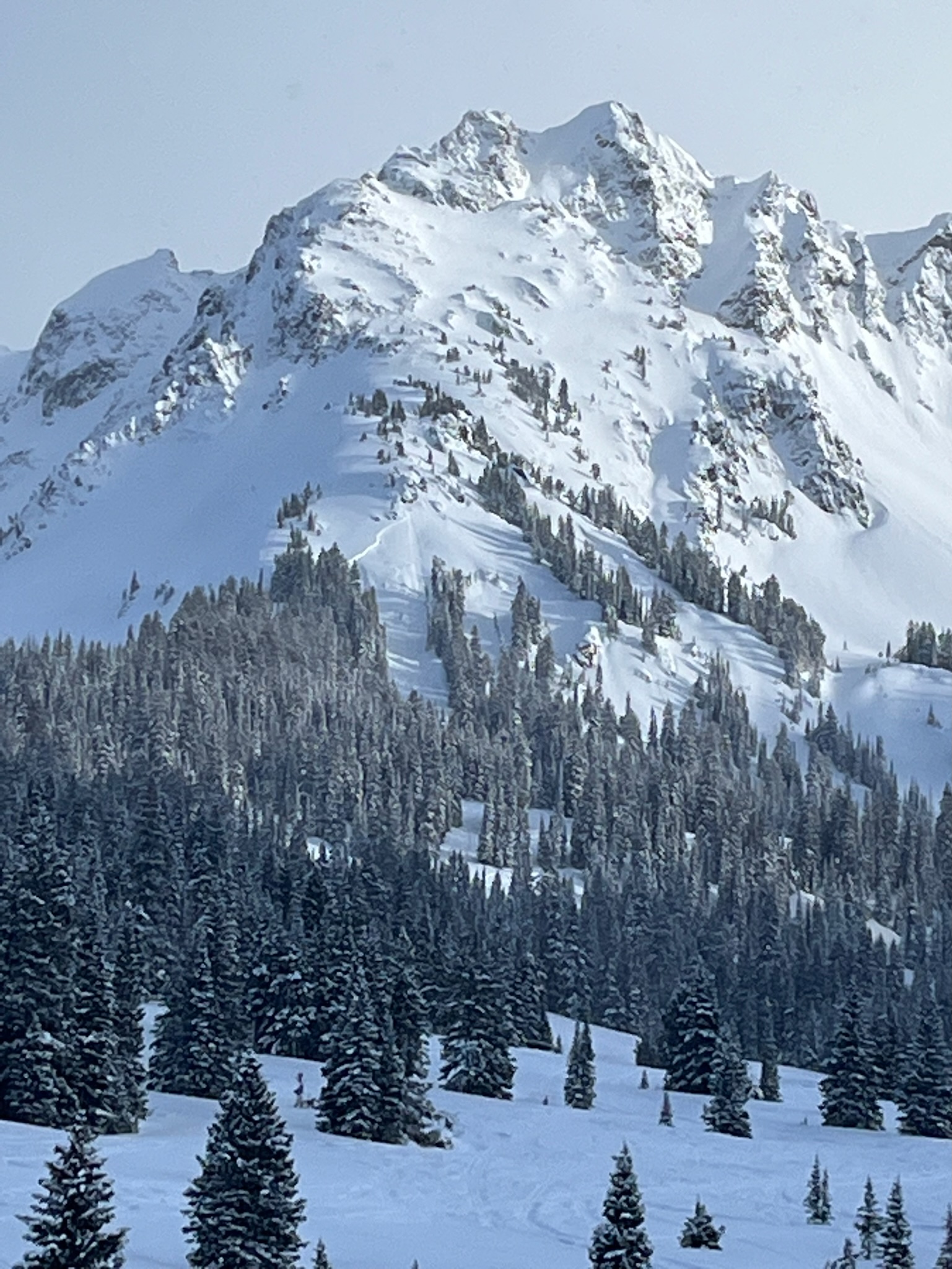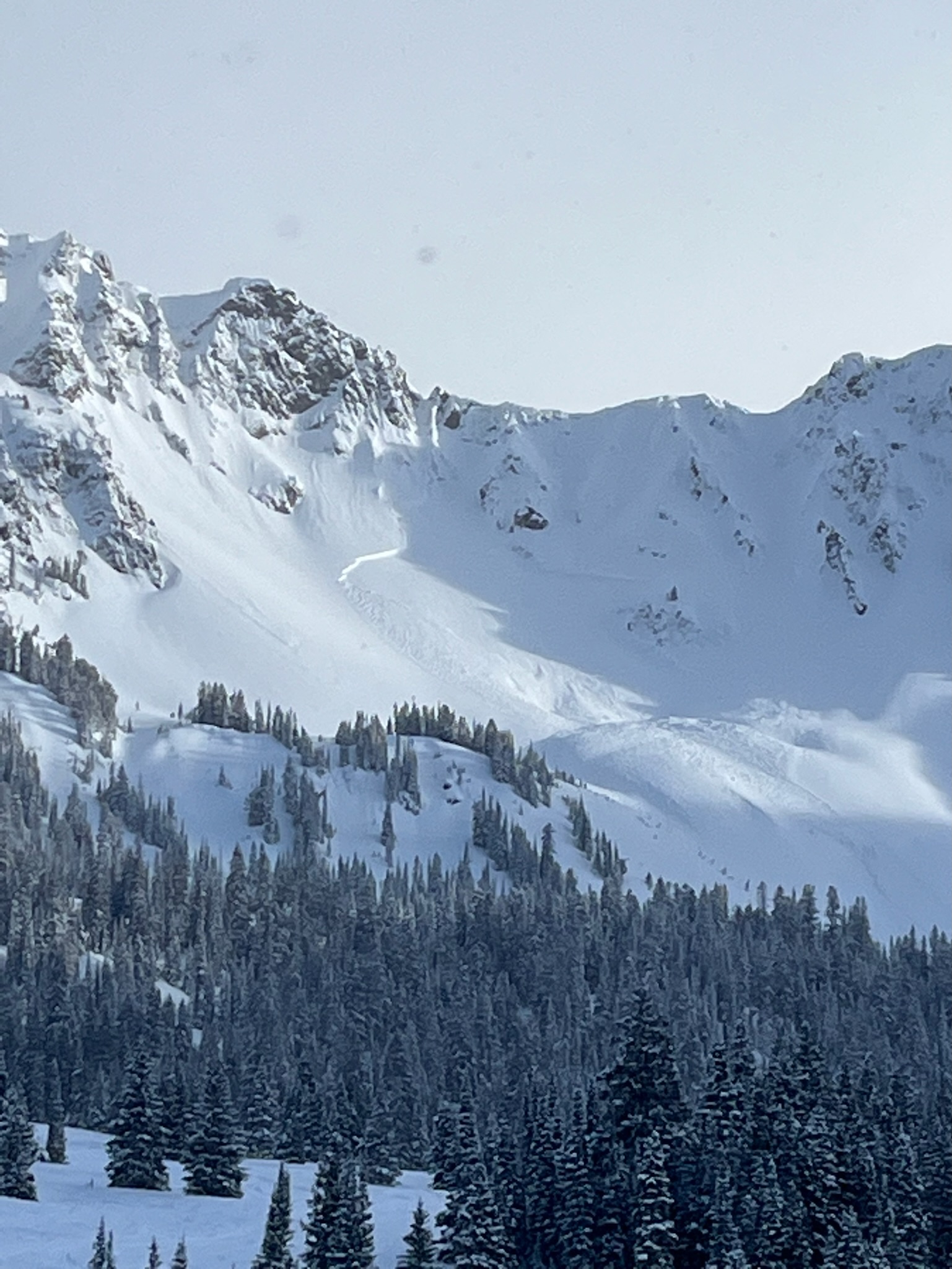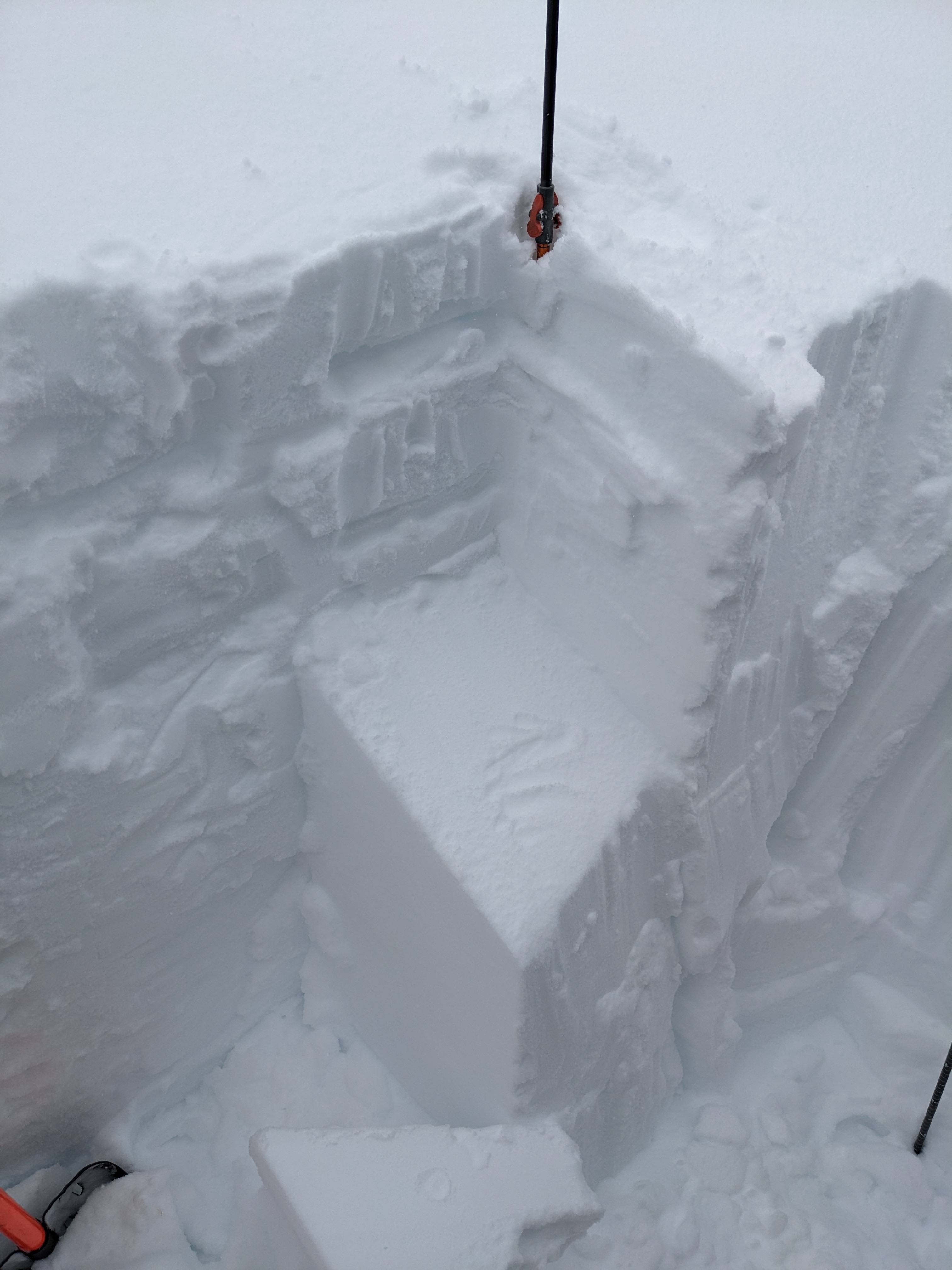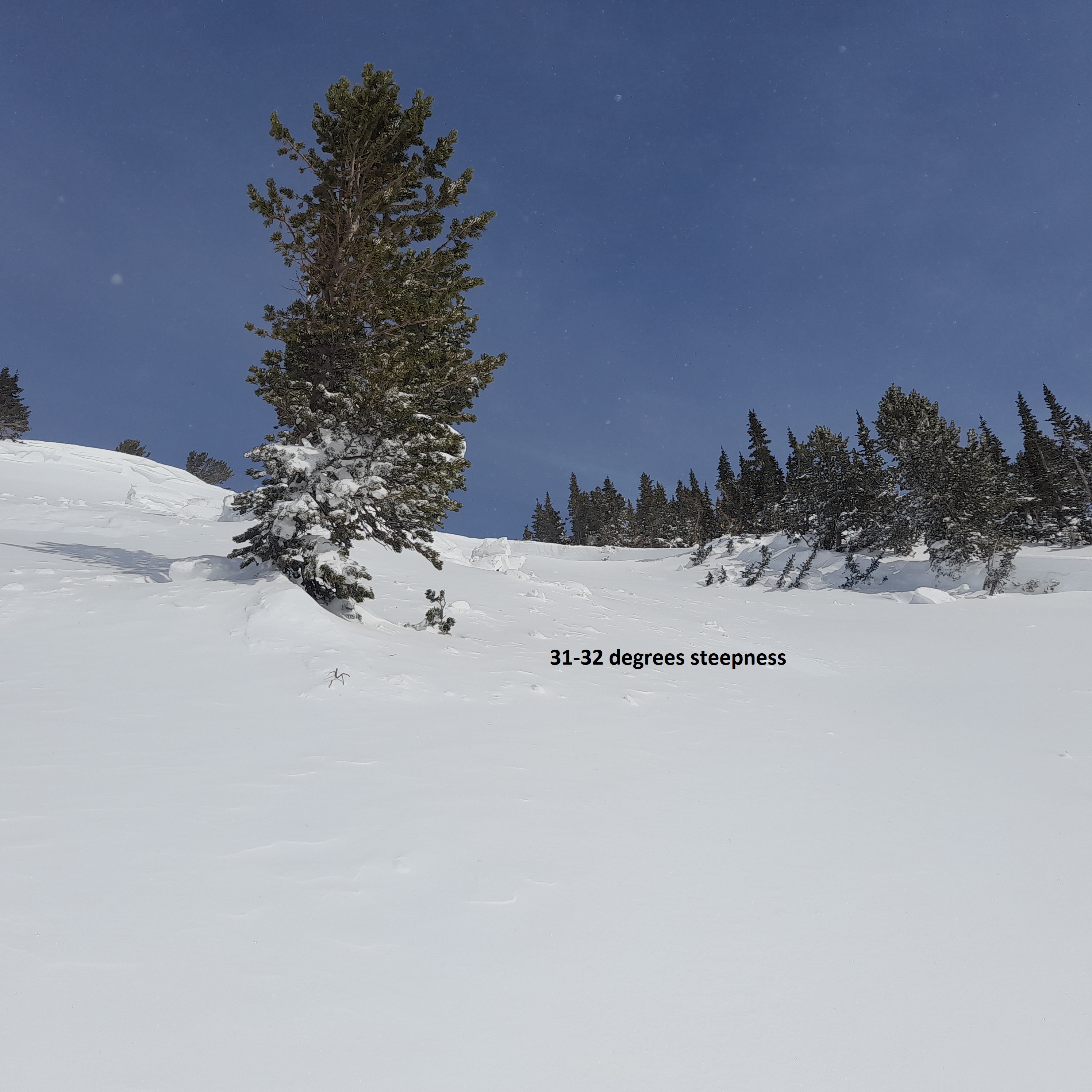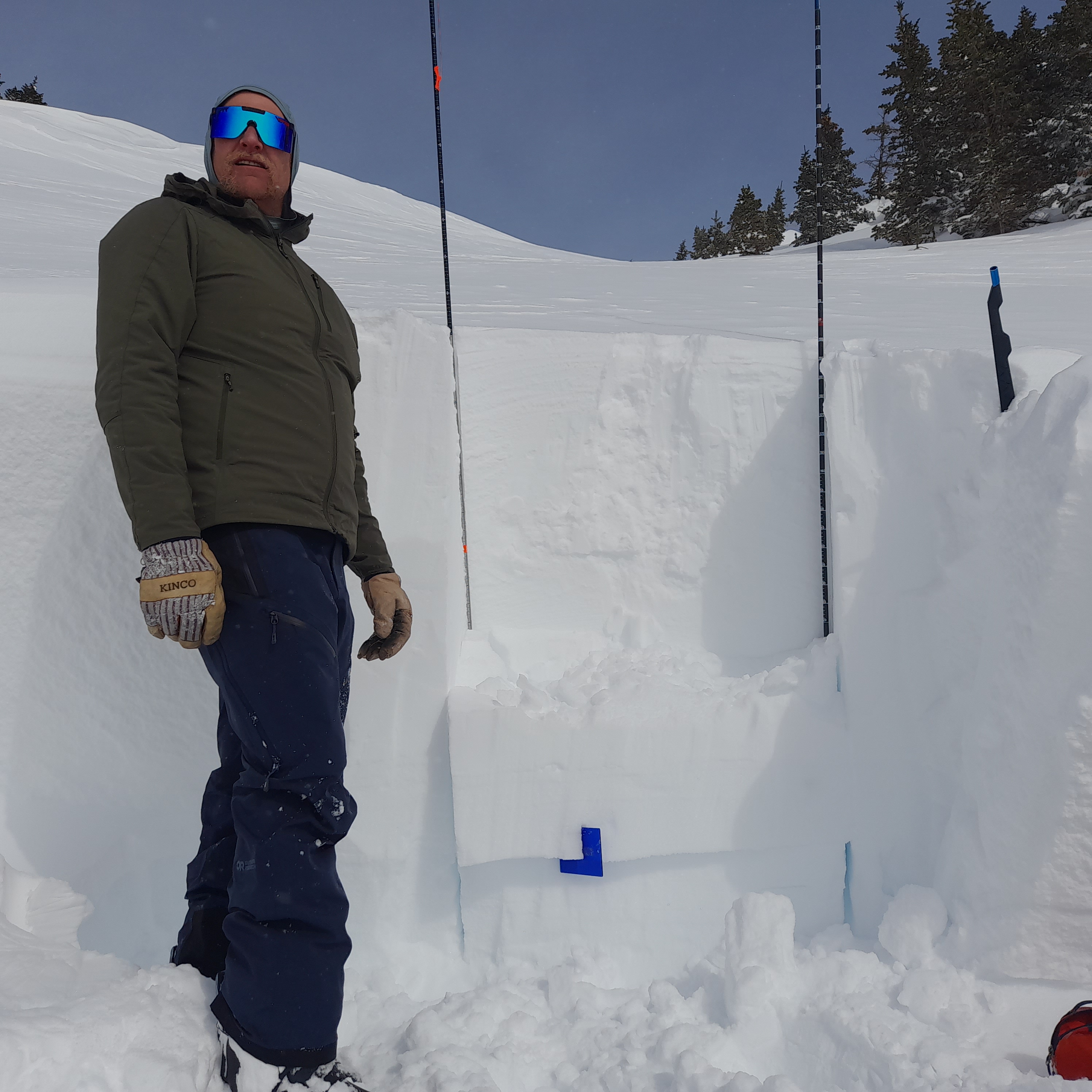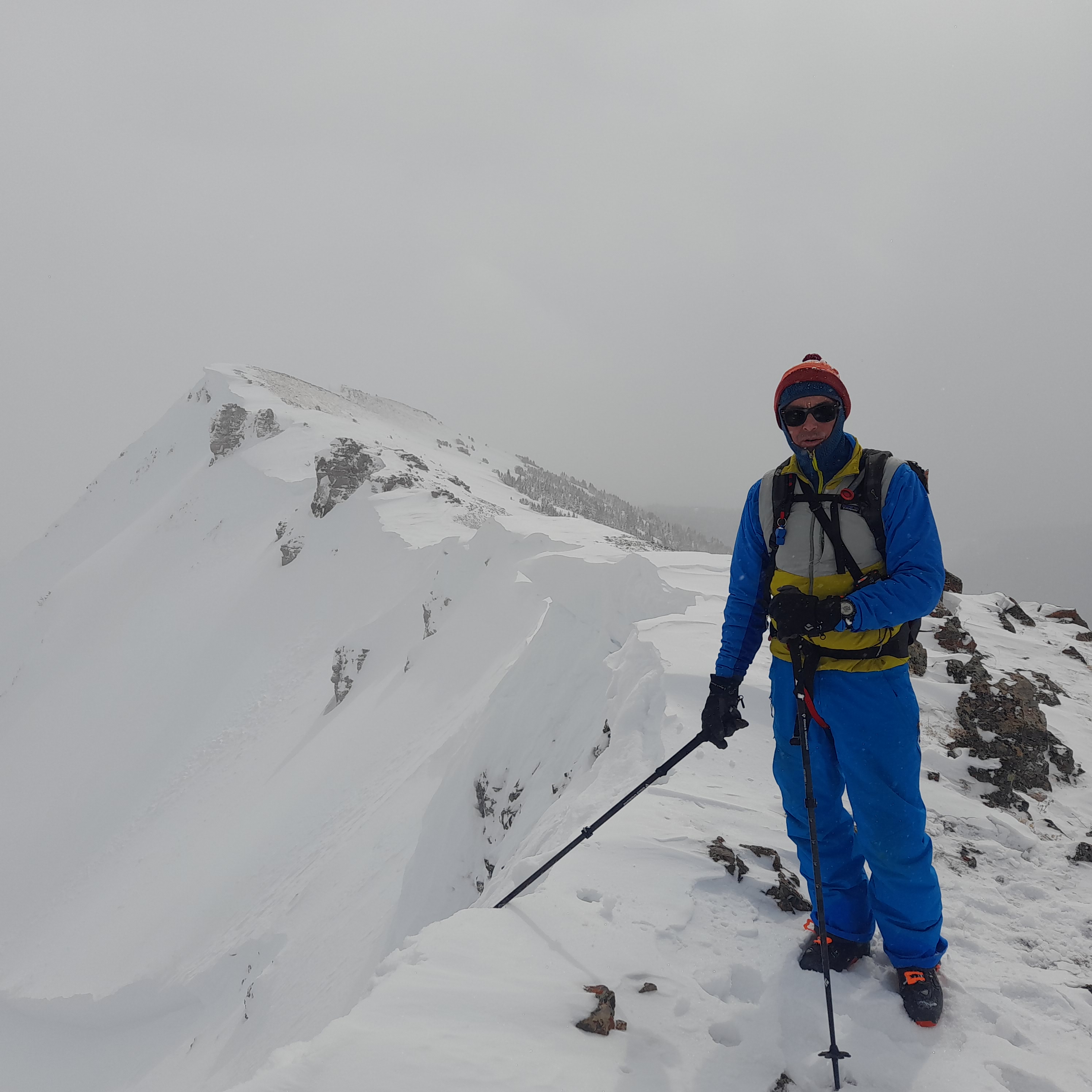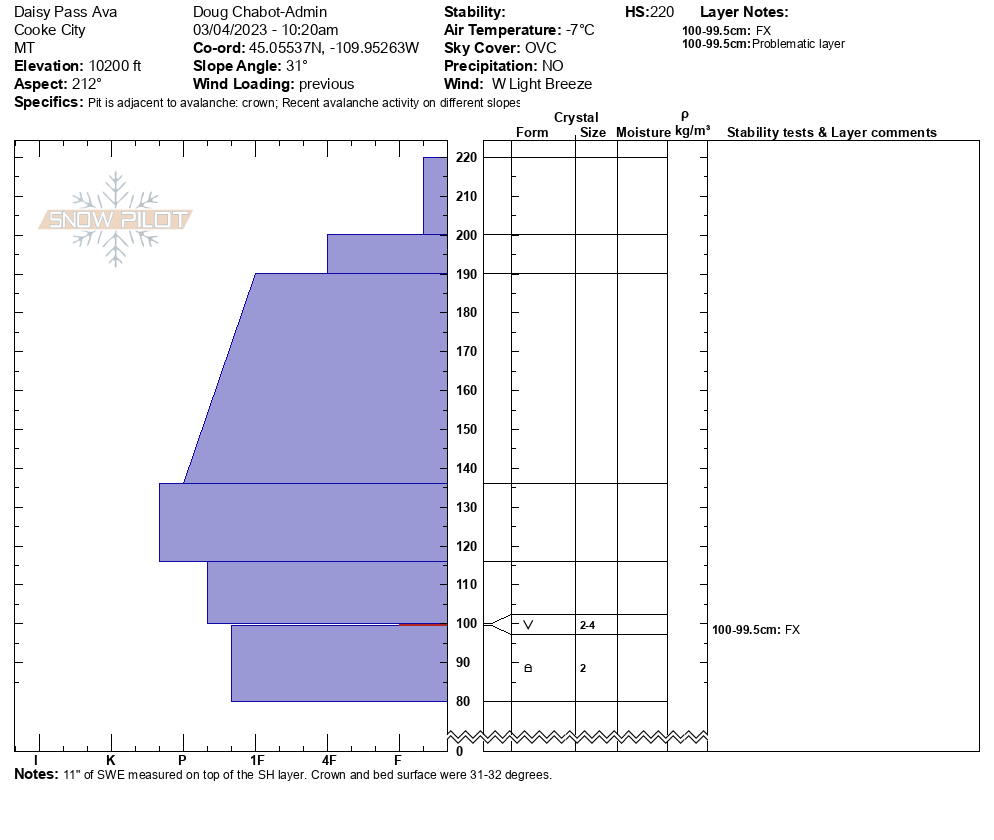Snow Observations List
We skied the ridge north of Blackmore (Tomahawk Ridge?) traveling between 6800' -9200' on SE-NE aspects. We dug two pits. one at 8000' on a NE aspect, HS 170cm fair structure, good strength. ECTN24 @ 45cm below the surface. With loupe and card I could find a few SH feathers on the failure plain.
Second Pit. 9200', NE, previously loaded. HS 210. ECTN28@ -40cm. similar structure but bed surface was much harder (P) old wind board. Couldn't find any surface hoar but found .5mm NSF on failure plain.
On the ridge above, ~9400' on a NE aspect there was a natural avalanche, maybe cornice failure, probably same timeframe as the Divide slides. ran ~600'.
HS-N-D2-R2-O
Wide spread surface hoar on top this morning. Sun was knocking it down on solar slopes by 11:30. Snow (S1) started at ~12:15
Full Snow Observation ReportWe skinned up the east face of the Throne and dug at the top of the east face (8100 ft, east aspect) and again on the north facing slope at top of the throne itself (8300 ft, north aspect). Snow depth of ~7 ft on the east face and ~4 on the north. ECTX in both pits. No cracking, collapsing, or other signs of instability. No avalanches observed. Little wind effect in the new snow. South aspects starting to get a surface crust, no crust on east or north.
Full Snow Observation ReportAs we were leaving the zone, loose snow naturally flushed out of the steep north /east facing couloirs / cliffs NW of Ainger Lake, fell over some cliffs, and triggered additional dry loose and what appeared to be some small storm slab pockets, out onto the apron.
Viz was not great re: details, but it was a humbling amount of snow moving on its own, without any obvious signs of warming or wind transport. No other yellow flags observed throughout the tour.
Photo attached of a recent avalanche near Cooke, on the north face of Mt. Republic. Steep, rocky, north facing. Everything that I have been seeing the last 2 days has been similar: steep, rocky north faces above tree line, often associated with wind loading, and cornices. We observed 4 other similar avalanches yesterday, like the photo attached.
My group and I spent March 5th - 8th in the Hellroaring Creek drainage on the SW side of the Centennials. We were right on the heels of the 13ish day long storm in the Island Park area. From what we gathered, the snowpack was handling the loading very well. We saw no natural avalanches. Pits dug on shady aspects were around 250cms deep and had few noticeable weak layers and no reactivity during testing. Pits on South and West aspects were about 200cms deep and had a thin pencil hardness crust (melt/freeze I believe) ranging from 115-140cms above ground. This crust had facets around it and was reactive in column tests but showed now propagation in the ECTs.
Full Snow Observation ReportI dug a 113cm deep pit at 7,610' on a SE aspect in the Bacon Rind area. I found about 31cm of fist density facets and depth hoar at the bottom. In an extended column test I got a score of ECTN 27 at 80cm up from ground on a 1cm thick layer and ECTN 28 at 68cm up from ground on a 3cm thick layer. I didn't get too in the weeds with grain id but both of these layers were a mix of low density facets and what seemed like a non-continuous melt form crust.
Across the road from Bacon Rind at 7,070' on a west facing slope I saw a small skier triggered slide that ran into the Gallatin River.
Full Snow Observation ReportDr. Karl Birkeland of the National Avalanche Center skied into Bacon Rind with us today. We found the surface hoar layer that is causing avalanches elsewhere, but in Bacon Rind it is not a serious concern. This is the same layer responsible for deep avalanches in Cooke City and one nearby in Taylor Fork. In this area the weak layer is capped with 4" snow water equivalent (SWE) while in Cooke City it is under 11" of SWE, almost triple the weight. We found no other weak layers of concern.
Full Snow Observation ReportI went for a walk up to divide basin today and noticed two slides that occurred on high, steep, north facing slopes last night (Tuesday night) when the wind picked up
Full Snow Observation ReportWe toured into Hyalite Peak to investigate a large, skier-triggered avalanche that occurred on Saturday (avalanche details and photos). The avalanche broke 750' wide, ran 650' vertical and broke 3-5' deep. It failed on a layer of sugary facets buried 95 cm (3 feet) deep. This layer had not been producing avalanche in the weeks prior to this slide. We measured 8.3" of snow water equivalent contained in the slab overlying the weak layer. We tested the weak layer in the eastern most part of the crown and got an ECTP26.
Additionally, we found a very weak layer of facets and surface hoar buried 1-1.5 feet deep. This had nothing to do with the large avalanche. The party reported triggering some small wind slabs near the summit, these may have been related but we don't know for sure. This layer failed with at ECTP13 and ECTP20. We looked for it again on our exit from the basin and came up empty. It is certainly something that we will look for in the coming weeks, but the primary driver of our decision-making will remain the deeper instability for now.
Full Snow Observation ReportWe saw 6 natural avalanches on our ride in Lionhead. They all involved snow in the last week or two. On our exit we ran into who a group that witnessed a sledder triggering this slope. It was about 3 feet deep and was clearly wind loaded. Luckily he was not caught. When folks are triggering slides we know other slopes are also unstable. Be careful out there!
Full Snow Observation ReportFrom IG, “Noticed a few natural and human triggered surface slides of the new snow on the old crust layer. All of these were north of Bridger Bowl on The Ramp”
Full Snow Observation ReportOur party experienced a sudden collapse while ascending, as we exited the trees above Olie’s Woods and began to cross a a meadow @9600’. The collapse was assumed to be at least 100’ wide, as we saw a small tree shake approx 100’ from the leader and our entire party felt the collapse. We dug a pit and got the following results:
HS 135
ECTP 17; 55cm down.
SP- Q1, Sudden Planar failure, entire block slid into pit
Failed on 2mm facets, 10 cm below an ice crust.
Full Snow Observation ReportOn Buck Ridge today (3/5/23) we found fresh, unstable drifts and buried weak layers. Recent avalanche activity is a sign that buried weak layers could be triggered and cause large avalanches, even though we didn't see unstable results in our snowpack tests.
Be cautious of steep slopes, especially if they are wind-loaded and avoid steep slopes if you suspect buried weak layers exist. Recent snow being drifted into thicker slabs is adding weight to weak layers and may cause danger to rise.
Around 4 or 5 pm today we rode out of Sheep Creek into the Miller Mountain area. When we looked at Miller there was a large avalanche that appeared to have occurred naturally (to our knowledge). It looked like the crown was 12-24'' and a few hundred feet wide. The debris looked fresh and must have occurred today. Given the depth we assumed it was windslab that had built up sometime in the last few days; however, hard to tell from so far away. We also observed another smaller natural avalanche on an exposed ridge below Miller Mtn, this looks to have been about 12in deep and probably occurred on the same layer as the larger avalanche. Both were on N or NNW facing slopes in areas with heavy wind deposition.
Full Snow Observation ReportPST 50/100 at two layers - 115 down(crust facet combo) and 140 down (basal facet interface) 7500 ft NE aspect 15 degree slope angle. Several ECTX across region.
Full Snow Observation ReportWhile skiing Shafthouse Hill I intentionally trigger a wind slab on a small slope. The slab was actively forming with the new storm snow. I triggered it by ski cutting the slab at the rollover. It broke very easily and was approximately 15cm thick.
Aspect: SE
Slope angle: 36 degrees
Elevation: 8315’
Weather conditions @ 1130, overcast and moderate snowfall, 18 degrees F, winds SSE 15-20 mph.
Full Snow Observation ReportSingle pit (aspect: 100 deg, slope angle: 18 deg), two tests:
1. CTN
2. ECTX
- Lochlan Bennett, age 13, first snowpit (with assistance from a friend)
Full Snow Observation ReportOur party dug a quick pit while skiing Submarine Bowl on woody ridge. Our pit was E facing at 9800 ft. Total snow depth was 205cm. We got an ECTN 25 @176cm from the ground. Though we were not able to get propogation on that layer, we were reliably able to get Q1 failures on that layer with a series of column tests which failed around 15-20 taps (5-10 elbow taps). Attached is a picture of one of these failed column tests. We didn't really observe any cracking or collapsing while we skied or approached from republic creek.
Full Snow Observation Report
Hey GNFAC,
I dug on a SE facing aspect at the top of the Skillet in Bacon Rind today.
I found a HS of 163cm, and a 40cm slab from the last two weeks of on top of at least four notable weak layers.
I was initially optimistic about the stability, but had an easy shovel shear test, followed by an ECTP17 Q1 at 120cm up from the bottom.
Our group opted not to ski the Skillet, and found some great turns in lower angle trees nearby.
Another observation of note is a widespread layer of surface hoar that was deposited about 4 days ago, and is now covered by about 10-12 cm of snow.
Ben Zavora of Beartooth Powder Guides and the GNFAC investigated a skier triggered avalanche near Daisy Pass (3/2). It was remotely triggered (they were not on the slope) and failed on a layer of feathery surface hoar crystals that formed in early January. The slab was 4 feet thick and very dense and termed a Deep Slab Avalanche. The recent snow and wind added weight and stressed this layer to its breaking point. In January we found surface hoar on all aspects, so it's a bit scary. Remotely triggering a 4' deep hard slab avalanche is dangerous. The slope angle at and near the crown was only 31-32 degrees; very shallow. Surface hoar is known to break on less steep slopes, which can catch us off-guard.
It's time to recalibrate our thinking because deep slab avalanches are deadly, yet not very widespread. It will become a low-probability, high consequence problem.
Full Snow Observation Report

